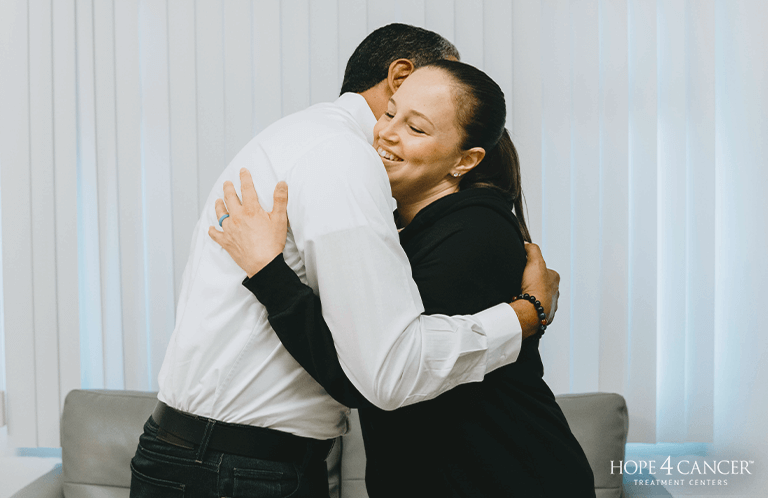Finding the treatment path that aligns with your unique values, medical needs, and healing goals can feel like a beacon of hope after receiving the unsettling news of a cancer diagnosis. However, some patients who resonate with alternative treatment may find this hope is met with yet another hurdle on their healing journey: how to share their plans with loved ones.
As research overwhelmingly demonstrates the impact that one’s social sphere can have on the trajectory of healing (1, 2), it’s both natural and important to feel your choices are understood and supported by your friends and family. Unfortunately, that can make the treatment path conversation seem all the more daunting — but have no fear! We’ve put together four proactive steps you can take to navigate this task with consideration and confidence.
1. Acknowledge
First and foremost, remember that your loved ones are concerned people who care about you. Though it may be on a different level, they are likely also navigating their own grief and fears around mortality and disease during this time. Try meeting them in a place of love first by acknowledging the deep love they have for you and your appreciation for them being by your side. If you suspect you may encounter some resistance, keep compassion in your own heart by acknowledging inside yourself that another person’s resistance is a reflection of what is going on under the surface for them more than it is about you.
2. Invite
Though more and more medical professionals are finally starting to recognize and embrace the effectiveness of alternative therapies, there is still a stigma among mainstream society, largely due to a lack of awareness and education. If your loved ones have never actively sought out information about alternative treatments, it’s possible that they may be skeptical of your decision since they do not understand the science behind it. As you explain your treatment path to loved ones, consider sharing your own research and inviting those who are interested to learn with you. (Our free biweekly webinars are a great resource for beginners, as they break down the science behind the exact therapies patients experience inside our treatment centers!)
3. Define
Before even opening up the conversation, it may be helpful for you to reflect on and get crystal clear on your own needs and boundaries. Especially if this is the first time your family or network has gone through a cancer crisis, you are likely in uncharted territory. Instead of winging it, define what kind of support would be most helpful for you ahead of time and enter into your tough conversations with those boundaries to help guide your interactions. It may help to write down your thoughts and bring them with you to stay organized and on track during your conversation.
Some questions you may wish to consider as you reflect:
- What does “support” mean to me?
- What actionable things can my loved ones do to make me feel most supported?
- How much input am I looking for from others in my decision-making process?
- What actions or behaviors cross a line for me or would make me feel unsupported?
Communicate these needs and boundaries to loved ones who you feel safe sharing your sentiments with as you reiterate how important their support is for you during this time.
4. Accept
Ultimately, remember that your healing journey is just that: yours. Whether you’ve chosen to pursue alternative, conventional, or integrative treatment, no one else can undergo the experience for you. Making the choice you feel most confident in not only gives you the most empowered healing experience, but can also have a direct physiological effect on healing outcomes (3). Not everyone may understand your decisions right away, and that’s okay. If you’ve gone through all of the above steps and are still encountering resistance, the final step is to accept your loved ones regardless of whatever differences you may have, as well as accept responsibility for pursuing the healing journey that resonates with you.
If you’re still researching treatment options and would like to know more about what alternative treatment could be like for you, reach out to our team today and receive a FREE personalized treatment program, tailored to your needs.
Key Research and Resources:
1. “Higher levels of perceived social support were also significantly associated with better QOL.”
Applebaum AJ, Stein EM, Lord-Bessen J, Pessin H, Rosenfeld B, Breitbart W. Optimism, social support, and mental health outcomes in patients with advanced cancer. Psycho-Oncology. 2013;23(3):299-306. doi:10.1002/pon.3418.
2. “Low social support was associated with higher risk of both colorectal cancer incidence and mortality in men.”
Ikeda, A., Kawachi, I., Iso, H., Iwasaki, M., Inoue, M., & Tsugane, S. (2013). Social support and cancer incidence and mortality: the JPHC study cohort II. Cancer causes & control : CCC, 24(5), 847–860. https://doi.org/10.1007/s10552-013-0147-7
3. “The beliefs and attributions that people hold can influence their health by affecting their behaviour (such as attendance at a screening programme; the food they eat; whether they take prescribed medication), or more directly by affecting a physiological system (such as the immune or cardiovascular systems).”
Marteau, T.M. (1989). Health beliefs and attributions. In: Broome, A.K. (eds) Health Psychology. Springer, Boston, MA. https://doi.org/10.1007/978-1-4899-3228-0_1

